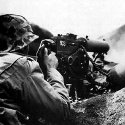|
Hob_Gadling posted:It's simple logistics. Pre-industrial countries simply did not have the means to supply troop movements in the scale industrialized countries can. For example, the Grande Armee of Napoleon was 600,000 men at the height of its power. An estimated 65 million soldiers took part in World War 1. It's not surprising the latter war sees more PTSD cases. A French WW1 corps in the thick of it would also have spent (and being in the receiving end of) more munitions than their Napoleonic counterparts, and they would also have been tied into battle for longer continuous periods of time. In the olden days wars consisted more about 1) marching pointlessly around or 2) sieges, while pitched battles were rare and disengaging was often preferred over an uncertain outcome. For example if an infantry battalion serving in the Napoleonic wars had participated in a couple of engagements during a year, 100 years later an infantry battalion might be spending weeks at a time in the front, constantly having to deal with sniper and artillery fire. And that is when both sides were standing passive. And you never knew when the enemy might start an offensive. Because of this material intensity and length spent under fire I find it likely that even per capita modern conflicts have caused far more PTSD cases than pre-industrial wars. Which is not to say that it didn't happen in the old days. Even a fairly normal car accident can be very traumatizing experience, now think of being part of a cavalry squadron charging toward a gun battery firing shrapnel at you at close range... I don't understand why people didn't go bonkers more often in old wars.
|
|
|
|

|
| # ? Jun 10, 2024 05:32 |
|
^^^^^what he said I wonder if part of it isn't the fact that pre-industrial age you might have a long campaign with only a few battles that would last hours or maybe a couple of days. Once you get large conscripted armies and modern supply lines you can have a front line with constant fighting for months at a time. Maybe it's not so much a few hours of being really scared as it is months and months of constant stress and fear that causes PTSD. I'm not an expert at all, just speculating.
|
|
|
|
Nenonen posted:Because of this material intensity and length spent under fire I find it likely that even per capita modern conflicts have caused far more PTSD cases than pre-industrial wars. Which is not to say that it didn't happen in the old days. Even a fairly normal car accident can be very traumatizing experience, now think of being part of a cavalry squadron charging toward a gun battery firing shrapnel at you at close range... I don't understand why people didn't go bonkers more often in old wars. There's also a big jump in accounts and descriptions of PTSD ever since indirect artillery fire became widespread. There's an enormous psychological difference in lining up to fight an army that's assembled on the other side of a field and having to hunker in a trench and attempt to endure a continuous and seemingly random artillery barrage.
|
|
|
|
tallkidwithglasses posted:There's also a big jump in accounts and descriptions of PTSD ever since indirect artillery fire became widespread. There's an enormous psychological difference in lining up to fight an army that's assembled on the other side of a field and having to hunker in a trench and attempt to endure a continuous and seemingly random artillery barrage. This can also be extended eg. to sniper fire and, for current unsymmetric conflicts, IEDs. Anything that can croak you any moment without warning is extremely stressful.
|
|
|
|
OctaviusBeaver posted:
No, you are completely right. The key is to remember that PTSD isn't about danger, it's about stress. If you live in a time when it's considered exceptional to fight two or three battles in a year then overall your life in the army is not that stressful. If you have to spend weeks or even months in near constant contact with the enemy and in danger that you cannot act to avoid then naturally you are under a great deal of stress. More stress > more PTSD.
|
|
|
|
quote:Even a fairly normal car accident can be very traumatizing experience, now think of being part of a cavalry squadron charging toward a gun battery firing shrapnel at you at close range... I don't understand why people didn't go bonkers more often in old wars. One thing that's interesting, is if you read the descriptions of the lives of historical figures who saw extensive combat, is just how many of them went on to lead lives filled with violence and alcoholism. I wonder how much behavior they considered fairly normal for a soldier would nowadays be seen as signs of PTSD.
|
|
|
|
Sure the absolute numbers are different but then so is modern medicin's capability to keep wounded soldiers alive and society's capacity to absorb larger number of comparatively lower-functioning veterans in the workplace afterwards. As was already said. But I won't go on a limb here and claim stuff about pre-modern PTSD, there's simply no evidence to make any claims based on our anachronistic definition.
|
|
|
|
Is there any evidence that some soldiers had PTSD before the advent of gunpowder? e: gently caress; pre-empted.
|
|
|
|
Koesj posted:Sure the absolute numbers are different but then so is modern medicin's capability to keep wounded soldiers alive and society's capacity to absorb larger number of comparatively lower-functioning veterans in the workplace afterwards. As was already said. We can actually talk quite a bit about pre modern PTSD. Herodotus wrote an account of a soldier who went blind despite having no injuries, and the discussions of bravery, cowardice and how warriors act in all sorts of different artistic pieces give a pretty good indication of how different societies and cultures approached combat and the impact it had on their soldiers. As armies professionalized it began to be medically documented and discussed as early as the middle of the 17th century, which is where we start to see accounts of "nostalgia", which was the popular nomenclature for the term. However, PTSD is undoubtedly a product of modernity because 1. Industrial wars can produce far more combatants than pre-industrial wars and therefore there are far more potential cases of PTSD to develop and 2. Modern war has far more random or unpredictable violence, which tends to be a triggering factor for developing PTSD. It's pretty clear cut, really.
|
|
|
|
SlothfulCobra posted:Is there any evidence that some soldiers had PTSD before the advent of gunpowder? From Wikipedia: quote:Reports of battle-associated stress reactions appear as early as the 6th century BC. One of the first descriptions of PTSD was made by the Greek historian Herodotus. In 490 BC he described, during the Battle of Marathon, an Athenian soldier who suffered no injury from war but became permanently blind after witnessing the death of a fellow soldier. Of course, there is the slight difficulty with old testimonies like this that we have no way of knowing if the blindness wasn't due to a sudden neurological disorder, neither caused by an external wound nor psychological disorder. But PTSD would seem like the most likely explanation.
|
|
|
|
SlothfulCobra posted:Is there any evidence that some soldiers had PTSD before the advent of gunpowder? That's not what I said mate.
|
|
|
|
tallkidwithglasses posted:However, PTSD is undoubtedly a product of modernity because 1. Industrial wars can produce far more combatants than pre-industrial wars and therefore there are far more potential cases of PTSD to develop and 2. Modern war has far more random or unpredictable violence, which tends to be a triggering factor for developing PTSD. It's pretty clear cut, really. I don't know if the randomness is as much of a contributing factor as the constant presence of danger. Up through the first half of the American Civil War life as a soldier was pretty predictable and not terribly dangerous outside of battles, and most battles themselves were pretty straightforward. Not that it was pleasant or anything, but at least you didn't have the constant pressure of danger drumming on your psyche. By the end of the ACW/WWI that had changed pretty conclusively. Unless you were well off the line you were always in danger, plus the things that were being shot at you were generally a lot nastier. I think it is the state of mind that condition brings that really breeds PTSD.
|
|
|
|
Kemper Boyd posted:It's worth noting that the US-trained Georgian army turned out to be utterly worthless at fighting a more conventional war against the Russians during the Georgian war, since the Georgian army had pretty strong focus on building up light infantry to be used for counterinsurgency warfare. That's fairly recent military history. My guess would be that Former Soviet Block Incompetence Factor also played a part. That would be a reason why Russian military is in a terrible state and things get stolen and sold, or the fiasco of first Chechnyan war, or Georgian vehicles lying by the side of the road because they ran out of fuel and were abandoned. Promotions through nepotism, et cetera.
|
|
|
|
bewbies posted:I don't know if the randomness is as much of a contributing factor as the constant presence of danger. Up through the first half of the American Civil War life as a soldier was pretty predictable and not terribly dangerous outside of battles, and most battles themselves were pretty straightforward. Not that it was pleasant or anything, but at least you didn't have the constant pressure of danger drumming on your psyche. There was a massive danger to noncombatants in premodern armies, but it was a different kind of danger. Until WWI, the biggest killer of troops in every war wasn't the enemy, it was disease. You were far more likely to die of dysentery than you were from a sword or bullet. It's interesting that the risk of disease back then was worse than the risk of being blown up by an IED now, both of them are essentially uncontrollable, yet the mind deals with the risks in different ways.
|
|
|
|
I would have to think that being in a besieged city/fort in pre-industrial times would take a similar mental toll to being trapped in a trench in WW1. Constant danger of death by random projectiles - Check Spend majority of time hunkered down - Check Appalling conditions - Check Nothing to eat - Check Cant escape - Check Goes on for months - Check
|
|
|
|
Flippycunt posted:I would have to think that being in a besieged city/fort in pre-industrial times would take a similar mental toll to being trapped in a trench in WW1. There were ways out of it, though. Once the walls were breached, the garrison could surrender honorably and would not be harmed, unless they decided to fight it out. So it wasn't quite as hopeless. And besides, the besiegers probably had it worse.
|
|
|
|
OctaviusBeaver posted:I wonder if part of it isn't the fact that pre-industrial age you might have a long campaign with only a few battles that would last hours or maybe a couple of days. ArchangeI posted:There were ways out of it, though. Once the walls were breached, the garrison could surrender honorably and would not be harmed, unless they decided to fight it out. So it wasn't quite as hopeless.
|
|
|
|
I cannot locate where it was mentioned. But I remember reading about classical Greek? soldiers returning from battle/war and receiving some sort of purification ritual. The consensus was that even back then people were aware of the trauma slicing someones face open can cause you. I think would be cool if we somehow purified our warriors upon returning from war. Maybe douse them in goats blood or something? Would be much more manly than having them talk to some shrink. ganglysumbia fucked around with this message at 16:48 on Jun 21, 2012 |
|
|
|
ganglysumbia posted:I cannot locate where it was mentioned. But I remember reading about classical Greek? soldiers returning from battle/war and receiving some sort of purification ritual. The consensus was that even back then people were aware of the trauma slicing someones face open can cause you. I read some stuff about how phalanxes fought and it was downright terrifying. You were basically either a shield guy or a stabber, and both jobs were physically arduous and extremely bloody. It takes a pretty good bit of force to wound someone with a soft bronze or poorly forged iron spear, and doing that for extended periods of time without seeing your target due to dust, shields and other people's bodies while the other side tries to do the same to you would be awful. The other option is to heft a considerably large shield and just soak up hammer blows, which doesn't exactly sound great either. It's basically hard physical labor, often in beating sun because summer was campaign season, punctuated by really, really gory wounds that are hard to see coming.
|
|
|
|
I could draw a crude correlation that the further away we've gotten from attacking each other the more increased the stresses become. Perhaps there's a primal instinct that kicks in and reassures us when wresting someone to the ground and clobbering them with a cudgel before they do. For instance bomber squadrons would get affected by the fact they never saw the effects of what they were hitting until watching it in the newsreels - notably Dresden. Or nowadays you have drone operators suffer breakdowns from being so affected over what they're shooting at on screen has no chance of actually harming him. Apparently, in Australia, the Navy has the higher percentages of depression, which could be more to being based at sea for so long. There was a thread in the military forums about PTSD which suggested the rise of the casual macho drinking male in the 50's was stemmed from WW2 vets drinking regularly to blot out memories and had been seen as a positive thing by the younger generation who imitated them.
|
|
|
|
ganglysumbia posted:
If we even provided them with the latter...
|
|
|
|
ganglysumbia posted:I think would be cool if we somehow purified our warriors upon returning from war. Maybe douse them in goats blood or something? Would be much more manly than having them talk to some shrink. This reminded me of a little anecdote I read about some child soldiers in Africa returning to their home village. I think it was in Uganda, but can't be sure until I pick up the book again. They'd surrendered to the UN, and gone through the rehabilitation program (whatever that involved), and were now trucked back home and try and reintegrate to African village life as best they could. So the UN people show up a few months later to check of this batch of kids, and ask the local elders how the kids are doing, and if they are integrating just fine. The elders say "everything is good, we washed them". The UN people are happy with this but don't see any of the kids. Some time later the UN learns what happened to the batch of ex child soldiers, they'd been tied to stakes in the river and left until it flooded, drowning them. Literally washed. I guess child soldiers is a military grey area though, because they're obviously effective enough for groups to continue using them throughout the world. Plus in parts of Africa the ratio of children to adults is crazy to a degree that we in richer countries with lower birth rates can't comprehend. I know children have always been used in war, off the front lines, but guns have made them as deadly as the next guy. Does anyone have any thoughts on the history of children at war, or where the future might lead? Some failed states under attack would see no problem in arming children for defence. Japan was willing to do it in the 2nd WW, and Iran did it during the Iran-Iraq war.
|
|
|
|
Rabhadh posted:
Define "children". No, seriously, the definition of who was old enough to fight has changed quite a bit over the course of history. I'm sure everyone has heard about people cheating at the recruitment office to join the Army at 16 or 17 because there was a war on and it sounded like fun. Are those child soldiers? Germany used even younger boys for AA duty in WWII (before they went completely batshit and started to hand Panzerfausts to 8 year olds). Even earlier, the career of an Admiral may well have started at age 10, when he became a naval ensign. Child soldier? What about cadet academies? Or princes in medieval times accompanying their father on campaign to learn the trade? I guess my point is that for someone to be a child soldier he has to be defined as a child first, and in a society where you became an adult in your early teens, the problem (as such) simply does not exist.
|
|
|
|
Yeah, it's only relatively recently in the Western World that the concept of not using children as soldiers has taken hold.
|
|
|
|
ArchangeI posted:Even earlier, the career of an Admiral may well have started at age 10, when he became a naval ensign. Child soldier? What about cadet academies? Or princes in medieval times accompanying their father on campaign to learn the trade? So true. I'm reading about King Taejong right now and he was helping his daddy fight pirates as a preteen. I think there is an important distinction between the children of aristocrats fighting for their careers etc and commoner children being pressed into service. That scene in Master & Commander where the cadet gets killed was pretty 
|
|
|
|
Alchenar posted:Yeah, it's only relatively recently in the Western World that the concept of not using children as soldiers has taken hold. I think it's impossible to say anything definitive either way. Many native tribes have manhood rites; before taking part in those, a boy is considered a child and can't take part in adult activities. Spartans started training at the age of seven. Regiment system evolved from being a lords temporary retinue to a permanent system where some cantons identified themselves as being a certain military unit; consequently, when the regiment left to war a whole city was on the move. One practical reason why African children get recruited as soldiers is AK-47 Kalashnikov assault rifle and its descendants. It's light and reliable enough for a child to use with some degree of efficiency. I've tried to find a peace organization that would target these types of weapons exclusively, since they are such a pandemic.
|
|
|
|
There's nothing special about an AK that would make it easier for a child to use. An SKS would probably work better, given the lack of full auto. Besides, it's not like they have fantastic choices of weaponry, I have seen photos of various warlord armies armed with Stg44s, PPShes, PPSes, Owens, Stens, and all sorts of other crazy WWII and early Cold War era stuff. Somehow banning AKs from Africa won't change anything.
|
|
|
THE LUMMOX posted:That scene in Master & Commander where the cadet gets killed was pretty He got out lucky. The real poor kids were the powder monkeys rushing about under the decks in close cannonade battery fire who had to dodge splinters, shot, roudshot AND hope to god the cask the powder he held was sealed properly as if a spark got to it...
|
|
|
|
|
Hob_Gadling posted:One practical reason why African children get recruited as soldiers is AK-47 Kalashnikov assault rifle and its descendants. It's light and reliable enough for a child to use with some degree of efficiency. I've tried to find a peace organization that would target these types of weapons exclusively, since they are such a pandemic. "Some degree of efficiency" is far above the standard of most African combatant groups anyway. I think the primary reason is more likely that when your force consists entirely of untrained, underfed, loot-motivated rabble blasted out of their minds on the local drug of choice children do just as good a job as adults.
|
|
|
|
In Uganda there is a steadier supply of small children than there is of adults. That would be the simplest reason. And children are easy to recruit, you just kill their parents and grab them...
|
|
|
|
Ensign Expendable posted:There's nothing special about an AK that would make it easier for a child to use. AK as compared to spear or sword, not other assault rifles. And I beg to differ: banning those particular rifles might actually do some good. The combination of cheap price, excellent availability of spare parts and certain symbolism (it's not accidental the flag of Mozambique does not have M-16 in it) is murderous.
|
|
|
|
Yeah as I mentioned before, the place is swamped with children. And giving them lots of drugs and brutalising them is part of their "training". Once you take them out of regular life and encourage to act irregularly, the brutalisation is self renewing as the kids do more and more horrible acts to impress the few adults around, who are the only authority figures around. Often when people have described the bush camps of groups of child soldiers, there is always a few adults or older teens standing around directing the children. Alot of the time, but not always, they too were once child soldiers.
|
|
|
|
Hob_Gadling posted:AK as compared to spear or sword, not other assault rifles. And I beg to differ: banning those particular rifles might actually do some good. The combination of cheap price, excellent availability of spare parts and certain symbolism (it's not accidental the flag of Mozambique does not have M-16 in it) is murderous. I dont think many antigovernment militias would care too much about a ban on the weapons theyre using to fight the government.
|
|
|
|
Probably not, but I refuse to accept the idea that there is nothing we can do about wars and genocides. There must be something, and just because I (or anyone else for that matter) haven't hit the idea yet doesn't mean it's not a worthwhile goal.
|
|
|
|
Hob_Gadling posted:Probably not, but I refuse to accept the idea that there is nothing we can do about wars and genocides. There must be something, and just because I (or anyone else for that matter) haven't hit the idea yet doesn't mean it's not a worthwhile goal. You should definitely follow the coming UN conference on Arms Trade Treaty next month: http://www.un.org/disarmament/convarms/ArmsTradeTreaty/ Also check out this Amnesty/Oxfam website: http://www.controlarms.org/ I whole-heartedly support any and all initiatives to constrain international arms trade especially in conflict zones. Unfortunately it's very hard to reach, even if major arms exporting countries came to an agreement. Even without new guns entering conflicts it's impossible to remove the guns entirely because whenever there's a civil war, thousands of guns get dispersed all over the region. Just one army storage depot looted by insurgents is enough for that. And they will stay in the region for decades, adding to destability and increasing the likelihood of future civil wars. Just think of the Libyan civil war, now anyone in Libya has access to an AK or heavier weapons and good luck trying to disarm the local militias and confiscating the stocks of some entrepreneurs. We have already seen the Tuaregs take over the northern half of Mali, largely due to the availability of weapons from Libya. It's a real NRA paradise there. Plus of course a lot of the weapons in civil conflicts come directly from neighbouring governments backing up the insurgents. Eg. Afghan Mujahedeen were directly or indirectly armed by Pakistan, USA, Saudi Arabia and others with an interest in not letting USSR maintain a strategic foothold in the region. That kind of 'trade' is invisible to any treaties. Nenonen fucked around with this message at 16:16 on Jun 22, 2012 |
|
|
|
Hob_Gadling posted:AK as compared to spear or sword, not other assault rifles. And I beg to differ: banning those particular rifles might actually do some good. The combination of cheap price, excellent availability of spare parts and certain symbolism (it's not accidental the flag of Mozambique does not have M-16 in it) is murderous. Because the MPLA won
|
|
|
|
The AK is used because it exists in such great number, and is relatively cheap. If there were another automatic rifle so ubiquitous, it would also see heavy use. The AK isn't why people are killing each other, it's just the most readily available 'how'.
|
|
|
|
What would Napoleon have accomplished if he had won the war against Britain? I don't think that he ever planned to take the remains of the Holy Roman Empire for himself, and he never really threatened Britain itself or the source of Britain's wealth, the colonies. The most I can imagine it leading to is establishing France as Europe's dominant military power (until the next time it butted heads with Britain), preventing total UK naval dominance, and gaining enough recognition for the new France to be considered legitimate, while Britain still outpaces the rest of Europe by sucking the colonies dry. Oh, and he'd stay king of Italy, I guess.
|
|
|
|
He wasn't King of Italy, I think Boney made one of his family that.
|
|
|
|
|

|
| # ? Jun 10, 2024 05:32 |
|
By the way, SeanBeansShako, your famous collection of British Empire History Magazines is almost intact, but issues "Enlarging The Jewel Conquest of Burma and Ceylon", "Empire of Iron and Steel", "Australia Strikes It Rich" and "The Imperial Machine" seem to be missing. Could you do anything about it? I'd like store these in case I end up on a train trip with a tablet.
|
|
|


























